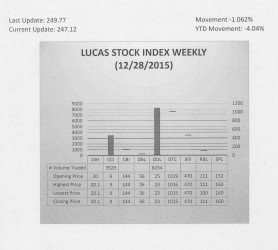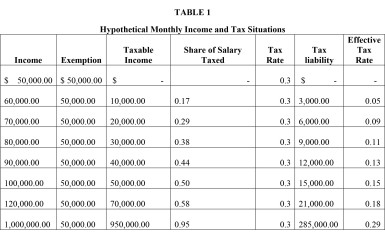Minimum role
Over the past three weeks, this writer looked at the challenges of revenue collection in Guyana. The picture that emerged is one in which the government is not collecting optimal revenues with several factors contributing to this situation. Among some of the things noted was that not all the parts of the tax structure worked effectively and efficiently. Some did not even play the minimum 
Tax systems
In discussing equity, comparisons of three types of tax systems are often used, namely the progressive tax system, the regressive tax system and the proportional tax system. While the three tax systems are important in the overall scheme of things, for income tax purposes, only two of the systems matter. These are the progressive and the proportional systems. The progressive tax system is one in which a greater share of a person’s income is exposed to higher rates of taxation. Multiple tax rates are used, with progressively higher tax rates being applied, as tax authorities seek to get higher amounts of income. It is important to note, however, that higher income taxpayers could reduce the incidence or burden of the tax on themselves by using various types of deductions wherever those are available. These strategies are typically referred to as tax avoidance strategies.

The Lucas Stock Index (LSI) fell 1.062 percent during the final period of trading in December 2015. The stocks of two companies were traded with 11,783 shares changing hands. There were no Climbers but there was one Tumbler. The stocks of Demerara Distillers Limited (DDL) fell 8 percent on the sale of 8,254 shares. In the meanwhile, the stocks of Caribbean Container Inc. (CCI) remained unchanged on the sale of 3,529 shares.
The other tax system is the proportional tax system. This is a system in which the same tax rate is applied to the tax base of the taxpayers. Even though the income level changes, the tax rate remains the same. Because all taxpayers use the same tax rate, some people refer to the proportional tax system as the fair or flat tax system.
Directed at income
Irrespective of what tax system is used, all taxes are directed at income. Because of social behaviour, some income is spent immediately while some is deferred for use at a later time. Whether for shorter or longer periods of time, income is usually divided between savings and consumption. In this discussion, the income that matters is gross income, the one that attracts the tax before income earners could decide on its use or deferment. Consequently, the tax that most people are concerned about is the income tax. It determines how much money they will have to spend and how much they will be able to defer. It is at that early stage of income allocation between the public and private sectors that the issues of equity and benefits emerge.
This is a particularly interesting discussion for Guyana since this country is supposed to be using a proportional income tax system, one that is supposed to be fair and equitable with every individual income earner being charged a 30 per cent tax rate. In the case of most companies, the tax rate is either 30 or 35 per cent.
Revenue
Despite the supposed fairness of the proportional tax system, interestingly enough, however, the tax system as it relates to income tax does not seem to generate realistic amounts of government revenues. The data in Table 1 below represent a hypothetical income situation in Guyana in which individual taxpayers earn a monthly income and what the tax consequence is. It could be observed that persons with lower incomes pay a smaller amount of their income in taxes while those persons with higher incomes pay a higher amount of their income in taxes.
A more salient observation is that the lowest effective tax rate for income tax purposes should be five per cent. Considering that incomes climb into the millions of dollars, the average tax rate should be higher than 12 per cent for incomes ranging from $60,000 to $1,000,000. Current revenue data indicate that the government is getting four per cent, even less than the realistic minimum which makes one wonder if Guyanese believe that the tax system is fair.
Exemption
A further point to note then is that the tax system in Guyana conceptually utilizes the ability-to-pay principle in its treatment of taxpayers. This viewpoint is supported by the exemption of the monthly amount of $50,000 from taxation. One could question whether the exemption amount is realistic or not. That is not being debated here. The key point is that government recognizes that not every Guyanese would have the wherewithal to pay taxes and has acknowledged that reality by granting the exemption. Despite the supposed fairness of the tax system, tax avoidance and tax evasion seem to be rampant. While it is acknowledged that many income earners are failing to pay taxes, income earners with substantially higher incomes appear able to reduce their taxable income substantially. Revenue collection of a four per cent effective tax rate implies that high income earners are able to bring their taxable income to the level of the lowest wage earners. To progressively higher income earners, the proportional tax system might not be a fair one, suggesting that concerns about equity and fairness do not occupy the minds of the impoverished alone.
Benefits
The amount of money being spent or revenues being foregone in order to achieve various types of economic goals, including higher levels of employment, increasing competitiveness and enhancing tax revenues, is another source of concern. This issue could be discussed from the benefits side. Benefits hinge on the belief that some good could come out of the spending undertaken by the government. Benefits refer to the extent to which Guyanese taxpayers feel that the government is providing them with good services and useful public goods whether directly or through the use of contractors. It implies also that there is satisfaction with the current way in which income is distributed. For most people, benefits constitute some combination of concern about the quality of the following types of service provided by the government. The services include education, health, sanitation, water, electricity, roads, bridges, safety and security. For Guyanese, benefits are about the protection of their liberty, reassuring them of their safety and creating opportunities so that they can achieve and advance their prosperity. In other words, benefits are about whether or not the government of the day is doing the things to make them feel good about themselves.
Intangibles
Some benefits are direct as in the case of education, electricity, passports, birth and death certificates, water and healthcare. Others are indirect like a bridge or a road which might be built far from where they live but is available to them when they need it. In any event, it is not easy to measure benefits precisely. What might be important to some persons, might not be important to others. As such, people tend to hang on to the intangibles such as efficient government, transparent and responsive government, and a clean, safe and easily accessible environment. Importantly, Guyanese look for actions that make them feel free, respected and prosperous. The government needs money to do these things. But when Guyanese perceive or realize that the benefits to a few outweigh those which they receive, they turn their backs on the government. Some estimates suggest that in 2014 alone the previous government might have given away $44 billion in tax revenues in order to gain $17 billion. The bulk of the concessions went to the private sector which received $28 billion and returned an estimated $3 billion to government coffers. The concessions straddle several industries and local and foreign companies were among the beneficiaries.
Tax load
However, not everything is as bad as it seems. Some businesses that received tax benefits made positive contributions to tax revenues. They had concessions of about $3 billion and generated revenues of about $12 billion. What is good about this is that a vast majority were locally-owned businesses. There were a few foreign companies that had a sizable and positive impact on the revenues of the government. It is regrettable that a few local companies have to bear the greater share of the tax burden while other companies get away scot free. These local companies are like beasts of burden. They carry the tax load and appear to get very little in return.





